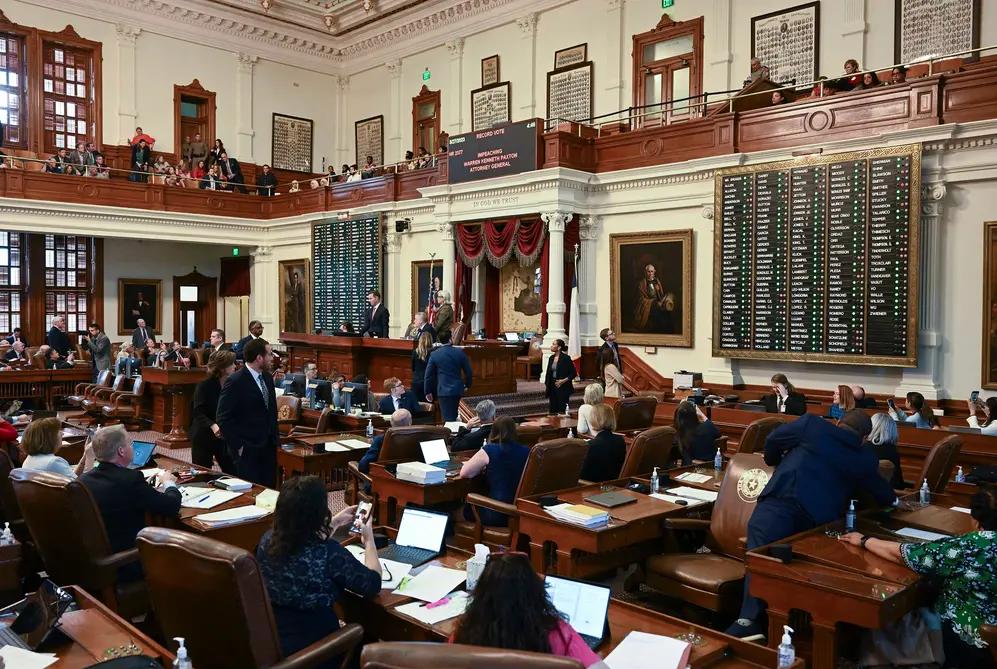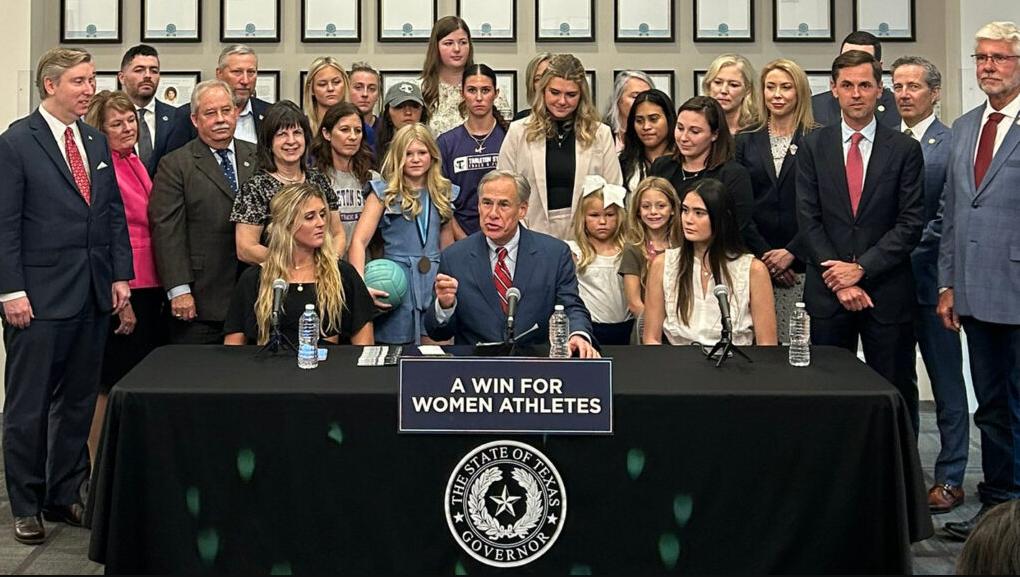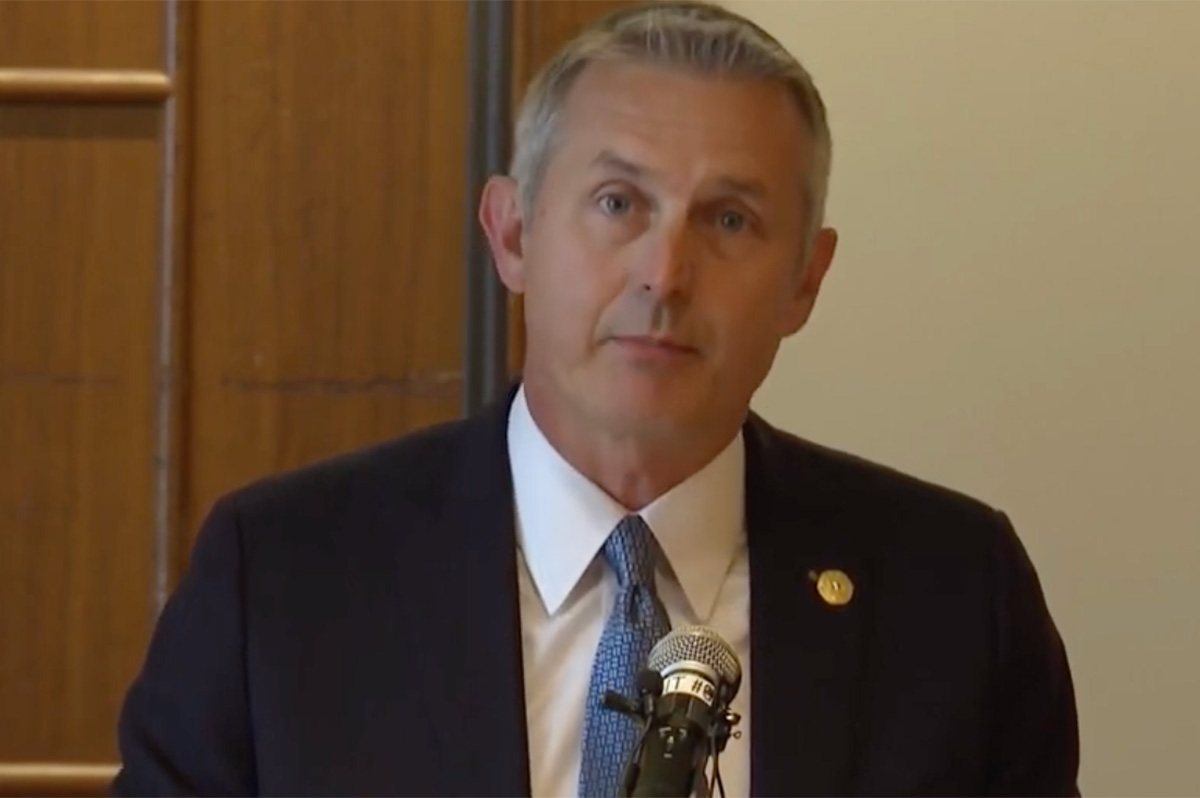Texas
Texas attorney general impeached, suspended pending outcome of Senate trial
Ken Paxton over the last decade has targeted LGBTQ people

Editor’s note: For the vast majority of the past 10 years the Texas attorney general has waged a relentless campaign to limit the rights and equality of LGBTQ Texans, especially transgender Texans. Today’s vote is significant in terms of the possibility that a Senate conviction would offer a potential respite from Paxton’s attacks on the LGBTQ community.
By Zach Despart and James Barragan AUSTIN, Texas | In a history-making late-afternoon vote, a divided Texas House chose Saturday to impeach Attorney General Ken Paxton, temporarily removing him from office over allegations of misconduct that included bribery and abuse of office.
The vote to adopt the 20 articles of impeachment was 121-23.
Attention next shifts to the Texas Senate, which will conduct a trial with senators acting as jurors and designated House members presenting their case as impeachment managers.
Permanently removing Paxton from office and barring him from holding future elected office in Texas would require the support of two-thirds of senators.
The move to impeach came less than a week after the House General Investigating Committee revealed that it was investigating Paxton for what members described as a yearslong pattern of misconduct and questionable actions that include bribery, dereliction of duty and obstruction of justice. They presented the case against him Saturday, acknowledging the weight of their actions.
“Today is a very grim and difficult day for this House and for the state of Texas,” Rep. David Spiller (R-Jacksboro), a committee member, told House members.
“We have a duty and an obligation to protect the citizens of Texas from elected officials who abuse their office and their powers for personal gain,” Spiller said. “As a body, we should not be complicit in allowing that behavior.”
Paxton supporters criticized the impeachment proceedings as rushed, secretive and based on hearsay accounts of actions taken by Paxton, who was not given the opportunity to defend himself to the investigating committee.
“This process is indefensible,” said Rep. John Smithee (R-Amarillo), who complained that the vote was taking place on a holiday weekend before members had time to conduct a thorough review of the accusations. “It concerns me a lot because today it could be General Paxton, tomorrow it could be you and the next day it could be me.”
Saturday’s vote temporarily removes a controversial but influential Republican figure in Texas and nationally. He has led an office that initiated lawsuits that overturned or blocked major Biden and Obama administration policies, sought to reverse Trump’s electoral defeat in 2020, aggressively pursued voter fraud claims and targeted hospitals that provided gender care to minors.
The Legislature had impeached state officials just twice since 1876 — and never an attorney general — but the House committee members who proposed impeachment argued Saturday that Paxton’s misconduct in office was so egregious that it warranted his removal.
“This gentleman is no longer fit for service or for office,” said committee member Rep. Ann Johnson (D-Houston). “Either this is going to be the beginning of the end of his criminal reign, or God help us with the harms that will come to all Texans if he’s allowed to stay the top cop on the take, if millions of Texans can’t trust us to do the right thing, right here, right now.”
Rep. Charlie Geren (R-Fort Worth), a member of the investigative committee, used his presentation time to criticize Paxton for calling representatives as they worked on the House floor to “personally threaten them with political consequences in the next election” if they supported impeachment.
Speaking against impeachment, Rep. Tony Tinderholt (R-Arlington), called the process “wrong.”
“Don’t end our session this way. Don’t tarnish this institution,” Tinderholt said. “Don’t cheapen the act of impeachment. Don’t undermine the will of the voters. Don’t give Democrats another victory handed to them on a silver platter.”
The vote came as hardline conservatives supportive of Paxton’s aggressive strategy of suing the Biden administration were lining up in support of him. Former President Donald Trump — a close political ally to Paxton — blasted the impeachment proceedings as an attempt to unseat “the most hard working and effective” attorney general and thwart the “large number of American Patriots” who voted for Paxton.
Trump vowed to target any Republican who voted to impeach Paxton.
As lawmakers listened to the committee members make their case, Paxton took to social media to boost conservatives who had come to his defense, including Trump, U.S. Rep. Marjorie Taylor Greene (R-Ga.) and conservative radio host Grant Stinchfield, who tweeted, “Kangaroo Court in Texas.”
About 90 minutes into the debate, the official Twitter account of the Texas attorney general’s office began tweeting at members of the committee to challenge some of the claims being made.
“Please tell the truth,” the agency’s account said.
Because Paxton was impeached while the Legislature was in session, the Texas Constitution requires the Senate to remain in Austin after the regular session ends Monday or set a trial date for the future, with no deadline for a trial spelled out in the law.
Impeachment represents the greatest political threat to date for Paxton, who has been reelected twice despite a 2015 indictment for felony securities fraud and an ongoing federal investigation into allegations of official misconduct that began in 2020.
The impeachment vote, on the third-to-last day of the regular legislative session, capped a tumultuous week at the Capitol. From Tuesday to Thursday:
- Paxton abruptly accused House Speaker Dade Phelan of presiding over the chamber while drunk and demanded that he resign.
- The House General Investigating Committee revealed it had been investigating Paxton in secret since March.
- The committee heard a three-hour presentation from its investigators detailing allegations of corruption against the attorney general.
- The committee’s three Republicans and two Democrats voted to forward 20 articles of impeachment to the full House.
Paxton, who was comfortably elected to a third term last year, made a rare appearance before assembled reporters Friday to criticize the process, saying he was not given a chance to present favorable evidence. He called impeachment an effort by Democrats and “liberal” Republicans to remove him from office, violating the will of voters and sidelining an effective warrior against Biden administration policies.
“The corrupt politicians in the Texas House are demonstrating that blind loyalty to Speaker Dade Phelan is more important than upholding their oath of office,” Paxton said. He added, “They are showcasing their absolute contempt for the electoral process.”
Many of the articles of impeachment focused on allegations that Paxton had repeatedly abused his powers of office to help a political donor and friend, Austin real estate developer Nate Paul.
In fall 2020, eight top deputies in the attorney general’s office approached federal and state investigators to report their concerns about Paxton’s relationship with Paul.
All eight quit or were fired in the following months, and most of the details of their allegations against Paxton were revealed in a lawsuit by four former executives who claim they were fired — in violation of the Texas Whistleblower Act — in retaliation for reporting Paxton to the authorities. Paxton’s bid to dismiss the lawsuit is awaiting action by the Dallas-based 5th Court of Appeals.
According to the lawsuit, the whistleblowers accused Paxton of engaging in a series of “intense and bizarre” actions to help Paul, including intervening in an open-records case to help Paul gain documents from federal and state investigations into the real estate investor’s businesses. They also accused Paxton of directing his agency to intervene in a lawsuit between Paul and a charity, pushing through a rushed legal opinion to help Paul avoid a pending foreclosure sale on properties and ignoring agency rules to hire an outside lawyer to pursue an investigation helpful to Paul’s businesses.
In return, the whistleblower lawsuit alleged, Paul paid for all or part of a major renovation of a home Paxton owns in Austin. Paul also helped Paxton keep an extramarital affair quiet by employing the woman Paxton had been seeing, the lawsuit said, adding that the attorney general may also have been motivated by a $25,000 contribution Paul made to Paxton’s campaign in 2018.
In their report to the House General Investigating Committee on Wednesday, the panel’s investigators concluded that Paxton may have committed numerous crimes and violated his oath of office.
Investigators said possible felonies included abuse of official capacity by, among other actions, diverting staff time to help Paul at a labor cost of at least $72,000; misuse of official information by possibly helping Paul gain access to investigative documents; and retaliation and official oppression by firing employees who complained of Paxton’s actions to the FBI.
The articles of impeachment accused Paxton of accepting bribes, disregarding his official duties and misapplying public resources to help Paul.
The articles also referred to felony charges of securities fraud, and one felony count of failing to register with state securities officials, that have been pending against Paxton since 2015, months after he took office as attorney general. The fraud charges stem from Paxton’s work in 2011 to solicit investors in Servergy Inc. without disclosing that the McKinney company was paying him for the work.
The impeachment articles also accused Paxton of obstruction of justice by acting to delay the criminal cases with legal challenges and because a Paxton donor pursued legal action that limited the pay to prosecutors in the case, causing further delays “to Paxton’s advantage.”
Taken in total, the accusations showed a pattern of dereliction of duty in violation of the Texas Constitution, Paxton’s oaths of office and state laws against public officials acting against the public’s interest, the impeachment resolution said.
“Paxton engaged in misconduct, private or public, of such character as to indicate his unfitness for office,” the articles said.
An attorney general had never before been impeached by the Legislature, an extraordinary step that lawmakers have reserved for public officials who faced serious allegations of misconduct. Only two Texas officials have been removed from office by Senate conviction, Gov. James Ferguson in 1917 and District Judge O.P. Carrillo in 1975.
If Paxton is to survive, he will need to secure the support of 11 senators. With the 12 Democratic senators likely to support his removal, votes for acquittal would need to come from the 19 Republican members.
None has publicly defended Paxton. In a television interview Thursday, Lt. Gov. Dan Patrick, who presides over the Senate, said merely that he believed senators would be responsible jurors and “do their duty.”
A complicating factor is Sen. Angela Paxton (R-McKinney), Paxton’s wife. State law requires all senators to attend an impeachment trial, though whether she will recuse herself from voting is unclear.
Paxton’s political base lies in the far-right faction of the Republican Party, where he has positioned himself as a champion of conservative causes and a thorn in the side of Democratic President Joe Biden. Paxton has criticized his opponents as RINOs (Republicans in name only) who “want nothing more than to sabotage our legal challenges to Biden’s extremist agenda by taking me out.”
He also retained the backing of the state Republican Party, led by former state Rep. Matt Rinaldi, who frequently attacks Republicans he considers to be insufficiently conservative. On Friday, Rinadi said the impeachment was Phelan’s fault for allowing Democrats to have too much influence in the House.
“The impeachment proceedings against the Attorney General are but the latest front in the Texas House’s war against Republicans to stop the conservative direction of her state,” Rinaldi said in a statement.
Paxton also has maintained a close relationship with Trump and filed an unsuccessful U.S. Supreme Court challenge to the 2020 presidential election. Paxton also spoke at Trump’s rally on Jan. 6, 2021, shortly before the president’s supporters attacked the U.S. Capitol.
Related:
***************************************************************************************
***************************************************************************************
The preceding article was previously published by The Texas Tribune and is republished by permission.
**********************
The Texas Tribune is a nonprofit, nonpartisan media organization that informs Texans — and engages with them — about public policy, politics, government and statewide issues.
Quality journalism doesn’t come free
Perhaps it goes without saying — but producing quality journalism isn’t cheap. At a time when newsroom resources and revenue across the country are declining, The Texas Tribune remains committed to sustaining our mission: creating a more engaged and informed Texas with every story we cover, every event we convene and every newsletter we send. As a nonprofit newsroom, we rely on members to help keep our stories free and our events open to the public. Do you value our journalism? Show us with your support.
Donation Link Here
Texas
Texas Supreme Court rules judges can refuse to marry same-sex couples
Decision published on Oct. 24.

Texas judges will now be permitted to refuse to officiate same-sex weddings based on their “sincerely held religious beliefs,” following a ruling issued Oct. 24 by the Texas Supreme Court.
The state’s highest court — composed entirely of Republican justices — determined that justices of the peace who decline to marry LGBTQ couples are not violating judicial impartiality rules and therefore cannot be sanctioned for doing so.
In its decision, the court approved an official comment to the Texas Code of Judicial Conduct clarifying that judges may opt out of performing weddings that conflict with their personal religious convictions. This clarification appears to directly conflict with existing provisions that prohibit judges from showing bias or prejudice toward individuals based on characteristics such as race, religion, or sexual orientation.
“It is not a violation of these canons for a judge to publicly refrain from performing a wedding ceremony based upon a sincerely held religious belief,” the court’s comment states.
The original code explicitly bars judges from showing favoritism or discrimination, declaring that they must not “manifest bias or prejudice, including but not limited to bias or prejudice based upon race, sex, religion, national origin, disability, age, sexual orientation, or socioeconomic status.”
The case traces back to McLennan County Justice of the Peace Dianne Hensley, who was publicly reprimanded in 2019 after refusing to marry same-sex couples while continuing to perform ceremonies for heterosexual ones, the Texan reported.
The State Commission on Judicial Conduct found that her actions cast doubt on her ability to act impartially, but Hensley has spent the past six years challenging that reprimand in court, arguing that she was punished for adhering to her Christian beliefs.
In a statement responding to the Oct. 24 ruling, Texas House LGBTQ Caucus Chair Jessica González expressed disappointment with the decision.
“The Texas House LGBTQ Caucus is disappointed, but not surprised, to learn that the Texas Supreme Court is not willing to stand up for the rights of LGBTQIA+ Texans,” she said. “Our right to marriage should never depend on someone else’s religious beliefs. This change in the Judicial Conduct Code will only further erode civil rights in Texas.”
The Texas Supreme Court is also currently reviewing a related matter referred by the 5th U.S. Court of Appeals. That case involves another judge, Keith Umphress, who similarly refused to perform same-sex weddings for religious reasons. The 5th Circuit has asked the Texas justices to clarify whether the state’s judicial conduct code actually forbids judges from publicly declining to officiate same-sex weddings while continuing to perform ceremonies for straight couples — a question that could further define the boundaries between religious liberty and judicial impartiality in Texas.
Texas
Democrats block anti-trans legislation by breaking quorum in Texas
Lawmakers flee state to halt GOP-backed redistricting and anti-trans policies

As Texas House Democrats fled the state to prevent Republicans from gerrymandering Democratic-held districts to flip seats, they also blocked anti-transgender legislation from being considered simply by not showing up.
More than 50 House Democrats left Texas on Sunday in an attempt to pause—if not kill—recent Republican-proposed and Trump-encouraged measures making their way through the state House.
This move by Democrats is called “breaking quorum,” and means the Texas House has fewer than the required minimum number of representatives present to conduct business. In total, the Texas House has 150 seats. Republicans hold only 88 seats—less than the 100 required to meet quorum—pausing the legislative session.
The Democratic legislators traveled to Illinois and New York, two Democratic strongholds with outspoken governors vowing to protect them and prevent Republicans from gaining an unfair advantage in the middle of the legislative calendar—at Trump’s behest.
The major issue Texas Democrats are drawing attention to is the recent redistricting plan, which would flip five Democratic U.S. House of Representatives seats to Republican ones through the use of gerrymandering, or strategic manipulation of district boundaries. This gerrymandering would likely result in Republicans retaining control of the U.S. House in the 2026 midterms.
In addition to redistricting, Republicans have proposed Senate Bill 7 (SB7), also known as “The Trans Bathroom Ban.” This bill mandates that people use the bathroom in government buildings, schools, and women’s violence shelters that corresponds with their sex at birth, rather than their gender identity. The bill would also require incarcerated individuals to be placed in facilities that match their sex at birth.
Proponents of the bill, like Fran Rhodes, the president of True Texas Project—a hardline conservative group that opposes LGBTQ rights and immigration—argue that without SB7, “we put women and girls at risk.”
This proposed legislation has been denounced by Equality Texas, which says it would not only put trans women at risk, but also cis women, who would be subject to “invasive gender inspections.” They argue this would undermine the Republicans’ stated intent of the bill by subjecting women to unnecessary scrutiny rather than protecting them.
Multiple cis women have come out in opposition to the bill, including Wendy Davis, a lawyer and former member of the Texas State Senate, who called the bill “a solution without a problem.”
Davis continued, saying that “Our trans sisters deserve to be safe in the restroom, just like we deserve to be safe in the restroom.”
Additionally, some Black Texans have sounded the alarm on this bill, likening it to Jim Crow-era segregation legislation—but instead of skin color, it uses gender identity to discriminate.
As the clock runs out on this 30-day special session ending Aug. 19, there is a chance Republican Gov. Greg Abbott could extend the session, as it is within his power as governor.
Texas Democrats hope this will pressure Republicans to work with them to reach a compromise on both redistricting and killing the anti-trans bill.
Texas
Texas lawmaker introduces bill to criminalize identifying as transgender
Republican’s proposal unlikely to pass

Republican Texas state Rep. Tom Oliverson introduced a bill last week that would prohibit Texans from identifying themselves as transgender on official documents.
The legislation would classify as a state felony the act of “knowingly [making] a false or misleading verbal or written statement” by identifying one’s birth sex incorrectly to a governmental entity or to an employer.
While the bill, according to the Houston Chronicle, does not yet have any cosponsors and is considered unlikely to pass, the effort underscores conservative lawmakers’ turn toward increasingly extreme measures targeting the trans community, particularly in Texas.
For example, Republican state Rep. Brent Money introduced a bill last month that would have expanded the 2023 law barring gender affirming health treatments for minors by also prohibiting providers from offering puberty-suppressing medication, hormone therapy or surgeries to adults if the purpose is to affirm their gender identity.
Equality Texas reports that the state legislature has seen more than 170 bills targeting the LGBTQ community so far this year.
Oliverson in 2024 unsuccessfully challenged the chamber’s Republican speaker, Dade Phelan.
-

 Sponsored5 days ago
Sponsored5 days agoSafer Ways to Pay for Online Performances and Queer Events
-

 District of Columbia4 days ago
District of Columbia4 days agoTwo pioneering gay journalists to speak at Thursday event
-

 Colombia3 days ago
Colombia3 days agoBlade travels to Colombia after U.S. forces seize Maduro in Venezuela
-

 a&e features4 days ago
a&e features4 days agoQueer highlights of the 2026 Critics Choice Awards: Aunt Gladys, that ‘Heated Rivalry’ shoutout and more


/https://static.texastribune.org/media/profiles/Zach_Despart_HC_TT_02.jpg)
/https://static.texastribune.org/media/profiles/0112James_Barragan_2x3.jpeg)



















